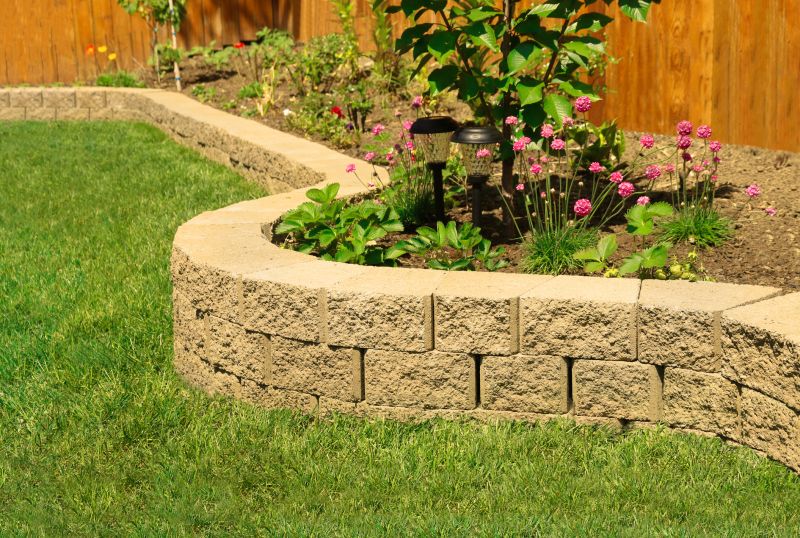Expert Picks For Block Retaining Wall Building Supplies And Accessories
Find out which high-quality products professionals recommend for efficient and effective block retaining wall installations.
 Installing a block retaining wall requires careful selection of products that ensure stability, durability, and proper aesthetic appeal. The foundation and the blocks themselves play crucial roles in maintaining the integrity of the structure over time. Different materials and accessories are available to cater to various project sizes and design preferences, from small garden borders to large landscape walls. Understanding the range of products suitable for retaining wall construction can help homeowners and professionals make informed decisions for successful installations.
Installing a block retaining wall requires careful selection of products that ensure stability, durability, and proper aesthetic appeal. The foundation and the blocks themselves play crucial roles in maintaining the integrity of the structure over time. Different materials and accessories are available to cater to various project sizes and design preferences, from small garden borders to large landscape walls. Understanding the range of products suitable for retaining wall construction can help homeowners and professionals make informed decisions for successful installations.
Top Overall Option
Concrete Block System
A concrete block system offers a versatile and durable foundation for retaining walls. These blocks are designed for easy stacking and often come with interlocking features that enhance stability. They can be used in various project sizes and provide a clean, professional appearance when properly installed. Incorporating appropriate drainage and reinforcement accessories can further improve the longevity of the structure.
Types of Products For Block Retaining Wall Installations
Concrete Blocks
Standard concrete blocks are commonly used for their strength and ease of installation. They come in various sizes and finishes to suit different design needs.
Natural Stone Blocks
Natural stone offers a more organic appearance and can be used to create rustic or traditional retaining walls with unique textures.
Interlocking Modular Blocks
Designed for quick assembly, these blocks often feature interlocking mechanisms that provide stability without the need for mortar.
Retaining Wall Caps
Caps are used to top off the wall, providing a finished look and additional protection against weathering.
Geogrid Reinforcements
Reinforcement grids improve stability in taller walls by adding tensile strength to the backfill.
Drainage Pipes
Drainage pipes help divert water away from the wall, reducing pressure and preventing water buildup.
Mortar or Adhesive
Used to secure blocks and enhance stability, especially in complex or decorative installations.
Leveling Tools
Essential for ensuring each course is even, these tools assist in achieving a professional finish.
Corner Blocks
Designed to create clean corners and edges, adding to the structural integrity and aesthetic appeal.
Drainage Gravel
Used behind the wall to promote drainage and reduce water pressure on the structure.
Landscape Fabric
Placed behind the wall to prevent soil and weed intrusion, maintaining wall stability.
Popular Choices
Widely used for their strength and versatility, concrete blocks are a common choice for many retaining wall projects.
Favored for ease of installation and stability, these blocks are trending among DIY enthusiasts.
Popular for their role in effective water management behind retaining walls.
Aesthetic and protective caps are frequently chosen to finish off walls professionally.
Increasingly used in taller or complex walls to enhance stability and durability.
Natural stone remains a popular choice for rustic and traditional landscape designs.
Commonly used to improve the longevity of the wall by preventing weed growth and soil intrusion.
Essential for achieving a uniform and professional look, widely used in DIY projects.
Popular for creating clean edges and corners with ease and precision.
A key component in any retaining wall project is the use of appropriate backfill materials and drainage solutions. Proper drainage prevents water buildup behind the wall, which can lead to pressure and potential failure. Geogrid reinforcements and drainage pipes are often incorporated to improve stability, especially in areas with high water tables or heavy rainfall. Additionally, accessories such as wall caps, connectors, and leveling tools facilitate easier installation and enhance the overall appearance of the finished structure.
Choosing the right products depends on several factors including wall height, soil type, and aesthetic preferences. While concrete blocks are common due to their strength and versatility, other options like natural stone or modular systems can offer different visual effects. It is also important to consider the compatibility of various components to ensure a cohesive and durable installation. Proper planning and selection of quality products contribute significantly to the longevity and safety of a retaining wall project.
Key Buying Considerations
- Wall height and load requirements to determine the strength and type of blocks needed.
- Material durability and weather resistance to ensure longevity over time.
- Drainage solutions including pipes and gravel to prevent water buildup behind the wall.
- Ease of installation and whether DIY assembly is feasible with the chosen products.
- Compatibility of accessories like caps, connectors, and reinforcement grids.
- Aesthetic preferences such as color, texture, and overall style of the blocks.
- Soil type and site conditions that might influence the choice of reinforcement or drainage methods.
- Project scale and whether modular systems or custom-built options are more suitable.
- Budget constraints while balancing quality and durability.
- Local building codes and regulations that may specify certain materials or methods.
- Availability of replacement parts or additional units for future modifications.
- Environmental factors that might affect the choice of materials and accessories.
- Supplier reputation and product reviews to gauge quality and reliability.
- Inclusion of comprehensive instructions or support for installation.
This content contains affiliate links. We may earn a commission from qualifying purchases to support our work, at no additional cost to you.
